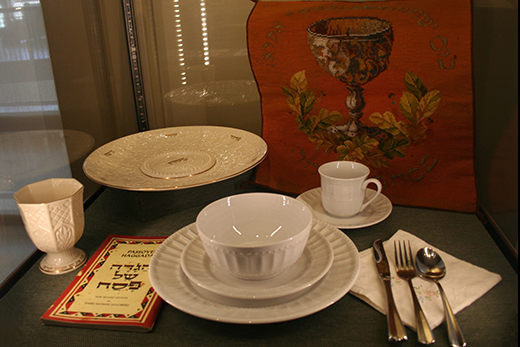Candler’s Pitts Theology Library has launched a new exhibit, “Reading the Telling: The Passover Haggadah Across Time and Place," highlighting the Haggadah (pl. Haggadot), a compilation of biblical passages, prayers, hymns and rabbinic literature that is read each year during the Jewish Passover Seder.
The exhibit, which opened March 7, will run through June 30 in the Pitts Exhibit Gallery. The exhibit is open during regular library hours, with a lecture event on April 3 and opportunities for guided tours in April and May. Learn more.
A collaboration between Pitts and Emory’s Tam Institute of Jewish Studies, the exhibit is curated by Adam T. Strater, a Wexner Graduate Fellow and PhD student in Hebrew Bible in Emory’s Graduate Division of Religion. It includes various Haggadot from 1695 to the present, acquired from the collections of Pitts, Emory’s Rose Library and the William Breman Jewish Heritage Museum in Atlanta.
Literally translated as “the telling,” the Haggadah recounts the story of the Israelites’ deliverance from Egyptian bondage, and structures the Seder service on the eve of Passover. The ritual reading of the Haggadah at Passover is based on Exodus 13:8: “You shall tell your child on that day, ‘It is because of what the Lord did for me when I came out of Egypt.’” (NRSV)
There are thousands of versions of the Haggadah throughout the world, as each “telling” can be customized to reflect the context of the community observing the Seder. The Pitts exhibit highlights this variety.
Featured items include:
- The first three editions of the illustrated Amsterdam Haggadah from the 17th and 18th centuries;
- "L ’Haggadá Illustrata" (1864), hailed as the most distinguished illustrated European Haggadah of the 19th century;
- "The Rainbow Haggadah" (1945), published for the 42nd Infantry Division’s Passover Seder in Dahn, Germany; and
- "The Freedom Seder" (1969), which reached out to African-Americans after the assassination of Martin Luther King Jr.
With nearly 700 volumes, Pitts boasts one of the largest collections of Haggadot in the southern U.S. The bulk of the collection formed in 2007 and 2008, with gifts from the personal libraries of Jewish social worker Richard K. Goldstein, who donated 579 volumes, and Rabbi David Geffen 59C, author of "American Heritage Haggadah," who donated 99 volumes.
M. Patrick Graham, librarian and Margaret A. Pitts Professor of Theological Bibliography, acknowledges that some may ask why the library at a Christian seminary would assemble such an extensive collection of a text associated with a Jewish ritual, but he says the answer is simple:
“The Jewish Passover has been celebrated for millennia, and the Haggadah tradition has come to embody this important religious practice," Graham explains. "A collection of Haggadot at Emory enables faculty and their students from across the university — and with this exhibit, visitors from across the nation — to explore this religious observance and how it has been adapted for and nourished faith communities throughout the globe.”
Admission to the exhibit is free. Guided tours will be offered on April 1, 15, and 29 and May 13. Register for a tour.
The public is also invited to an opening reception and lecture by Strater, the curator, on Sunday, April 3, from 2 -4 p.m.
View the exhibit catalog.
